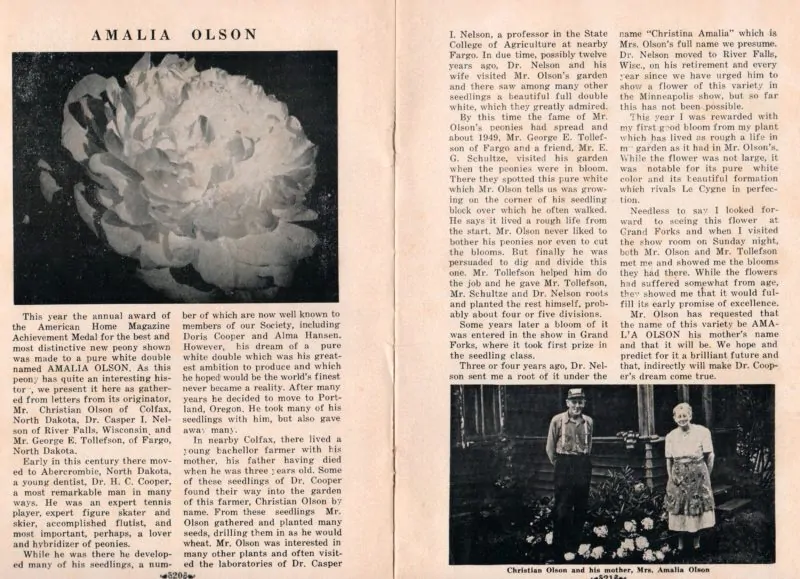Most of the peony species bloom before the regular cultivars of lactiflora and its’ hybrids. By planting some of these it is possible to enjoy a much longer peony season and there are many attractive species amongst them with both interesting foliage and pretty flowers. The bloom dates are usually compared to the widely grown hybrid cultivar Red Charm and the number of days before or after are then used to give an indication of its earliness or lateness. This way seasonal and geographic differences are less important and more observations make the data more reliable. Unfortunately the species are not too widely grown and thus observations of the blooming dates are not too common. There is a ‘bloom date project’ at the American Peony Society where you can see these dates for many cultivars, including several of the species. However, when it comes to the species, most are based on a single observation, thus reliability is not too high. Next to that, many of the species grown are not true-to-name but so-called garden hybrids, as different species grown together often give hybrid seeds, thus dates given may not always be for the true species. Last, many species are absent from the list, reflecting the fact that many are nearly impossible to get or to grow.
The list of the American Peony Society gives the following results for some species:
| Species/cultivar name | Remark | Number of observations | Days before Red Charm |
| Anika | Probably P. x lagodechiana (P. mlokosewitchii x P. caucasica) | 3 | -37 |
| P. caucasica | Official name nowadays P. daurica ssp coriifolia | 4 | -34 |
| P. mollis | A form of P. officinalis | 1 | -30 |
| P. kavachensis | A form of P. caucasica | 3 | -28 |
| Sydney | Very early triple hybrid | 2 | -27 |
| P. caucasica ex Tbilisi | 1 | -24 | |
| P. mascula | 1 | -23 | |
| P. villosa | A form of P. officinalis | 13 | -22 |
| P. broteri | Twice in the list | 1 | -21 |
| P. cambessedesii | 1 | -21 | |
| P. daurica | 1 | -21 | |
| P. obovata ssp willmottiae | 1 | -21 | |
| P. tenuifolia | 57 | -20 | |
| P. veitchii | 18 | -16 | |
| P. mlokosewitschii | P. daurica ssp mlokosewitschii | 6 | -15 |
| P. anomala | 22 | -13 | |
| P. peregrina | 4 | -13 | |
| P. broterii | 3 | -11 | |
| P. triternata | P. daurica ssp daurica | 2 | -9 |
A second listing was published by an enthusiastic peony species collector named Galen Burrell1
| Species/cultivar name | Remark | Blooming Date ’95 |
| Paeonia ruprechtiana | A form of P. caucasica | March 31 |
| Paeonia x lagodechiana | P. mlokosewitschii x P. caucasica | April 1 |
| Paeonia “Anika” | idem | April 2 |
| Paeonia coriacea | April 4 | |
| Paeonia officinalis banatica | April 18 | |
| Paeonia delavayi | April 20 | |
| Paeonia obovata alba | April 21 | |
| Paeonia japonica | April 22 | |
| Paeonia tenuifolia rosea | April 23 | |
| Paeonia mlokosewitschii | April 23 | |
| Paeonia wittmanniana macrophylla | Paeonia daurica ssp macrophylla | April 23 |
| Paeonia officinalis villosa | April 24 | |
| Paeonia officinalis officinalis | April 27 | |
| Paeonia cambessedesii | April 28 | |
| “Rock’s Tree Peony” | Paeonia rockii “Rockii” | April 29 |
| Paeonia mascula arietina “Northern Glory” | Paeonia arietina “Northern Glory” | April 30 |
| Paeonia lutea | Yellow flowered form of P. delavayi | May 2 |
| Paeonia mascula arietina | Paeonia arietina | May 2 |
| Paeonia brownii | May 2 | |
| Paeonia potanini trollioides | Another form of P. delavayi | May 3 |
| Paeonia mascula triternata | Paeonia daurica ssp daurica | May 5 |
| “Mai Fleuri” | P. lactiflora x P. wittmanniana | May 6 |
| Paeonia veitchii | May 12 | |
| Tree peony “Boreas” | P. delavayi hybrid cultivar | May 13 |
| Paeonia veitchii beresowskii | May 16 | |
| “Coral Charm” | Hybrid cultivar | May 19 |
| Paeonia peregrina | May 20 | |
| “Seashell” | P. lactiflora cultivar | May 27 |

The two lists are rather in agreement and could well be made into one list probably. “Coral Charm”, another widely grown cultivar, in the second list is in the first list stated as flowering 7 days after Red Charm so the number of days those species flower before Red Charm could be calculated as well. The number of days is obviously only a guideline that will differ from year to year, but the sequence of flowering should be more or less stable. Paeonia caucasica is nearly always given as the first one to flower, an observation I’ve also made myself. As paeonia caucasica is one of the easiest species to grow, it surely holds some more promise as a good garden subject. After the caucasica-related species/hybrids there is some gap with the others, therefore it would be nice to have data on more species not yet included to see if that peony-void can be filled. At the end of the season come P. peregrina and the ubiquitous P. lactiflora. Some species are rather variable in blooming dates, probably due to the larger territories they occupy giving more variation (P. delavayi, P. mascula, P. officinalis, P. anomala come to mind here).
It would be interesting to have a more reliable and comprehensive list probably, but the two lists above are the only ones I’m aware of. As I grow quite a few species myself I hope to add some more blooming dates of peony species. This may take a few years time as it is best to wait a few years until the plants are settled and have accustomed to the local conditions. If you grow at least two peony species, you are most welcome to add the blooming dates as well, this will make the list more reliable still. Just post them in the comments section below and we’ll see what we can do with them.
- Burrell, G. “Species peony bloom sequence, 1995.” In: American Peony Society Bulletin, nr 295, September 1995, p. 40.[↩]




















